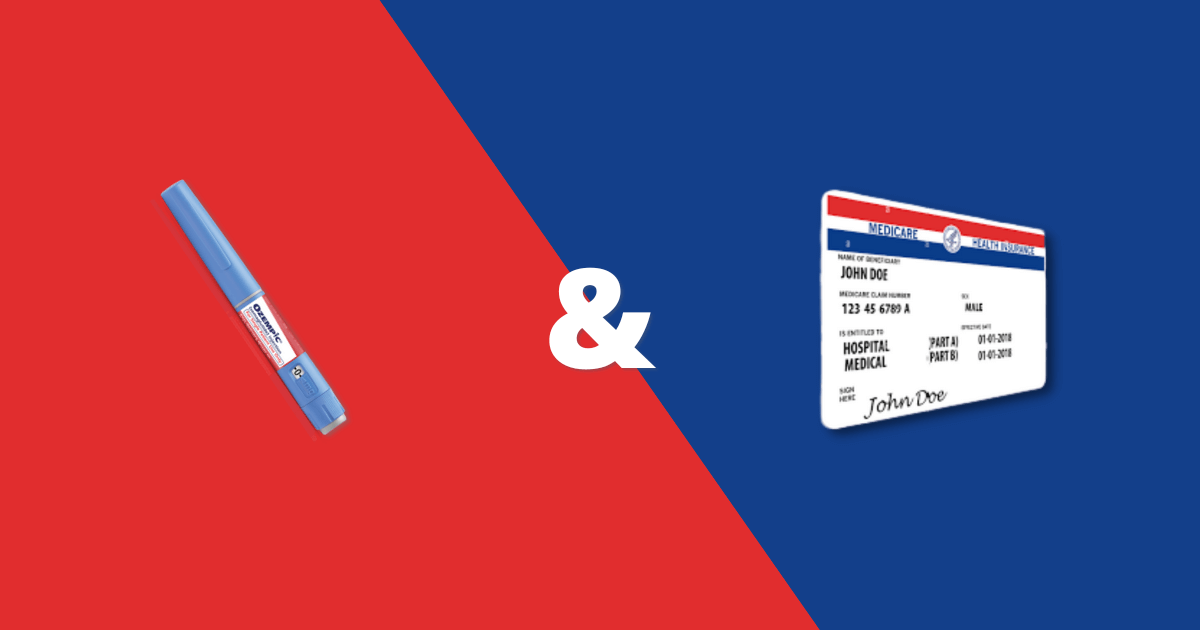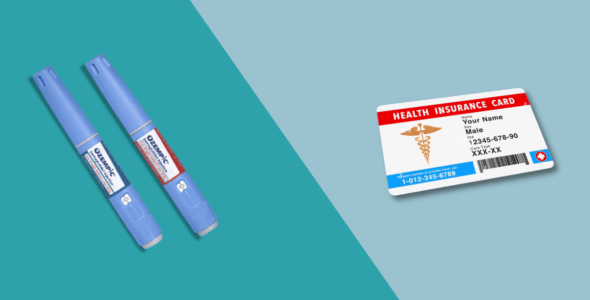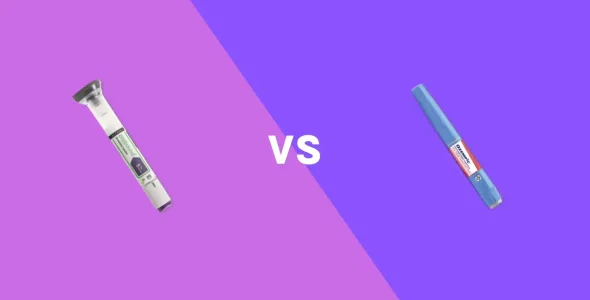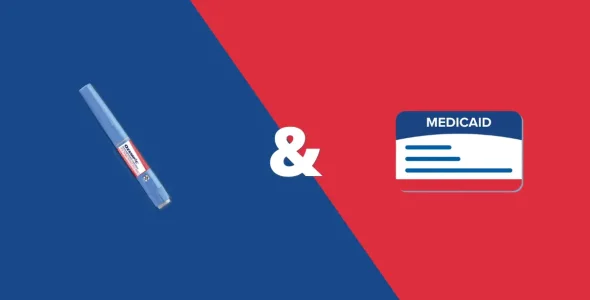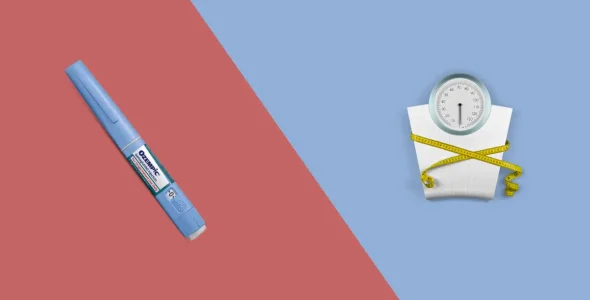Does Medicare cover Ozempic?
Key highlights
- Medicare does not cover any medications for weight loss alone.
- Medicare does not cover Ozempic for weight loss but will cover Ozempic if it is prescribed for type 2 diabetes.
- Similarly, Medicare covers Wegovy if it was prescribed to to reduce the risk of certain serious cardiovascular events, but will not cover it for weight loss.
- When you don’t have insurance coverage for this medication, you will spend between around $1000 per month on Ozempic.
- To get lower prices on Ozempic, you can use manufacturer coupons, discount cards, compare pharmacy prices or find out if you are eligible for any patient assistance programs.
Medicare only covers Ozempic for the treatment of type 2 diabetes. Medicare does not cover Ozempic for weight loss.
Similarly, Medicare does not cover any other medications such as Wegovy or Eli Lilly’s Zepbound or Mounjaro, if they are prescribed for weight loss.
Learn more about Medicare coverage for Ozempic and alternative options to save money if you do not have insurance coverage for this medication.
What is Ozempic?
Ozempic (semaglutide) is a brand name prescription drug that was approved by the FDA (U.S. Food and Drug Administration) in 2017 for the treatment of type 2 diabetes. It belongs to the GLP-1 receptor agonists class of medications that are meant to assist in maintaining normal blood sugar levels. GLP-1 refers to glucagon-like peptide-1, which is a naturally occurring hormone that helps your body regulate blood sugar.
This medicine works by stimulating the production of insulin following meals, slowing digestion and glucose production by the liver. As opposed to many other diabetes drugs that need daily administration, Ozempic is injected only once per week which is much more convenient, especially for those who don’t want to take their medication every day.
More than 38 million Americans have diabetes and GLP-1 medications like Ozempic are effective treatment options for the 90-95% of those people who are diagnosed with type 2 diabetes.
Does Medicare cover Ozempic?
Yes. If Ozempic has been prescribed for the treatment of type 2 diabetes, then it will be covered by Medicare. In case you have a Medicare Part D plan, you should be able to receive this medication under your prescription drug coverage as long as it is being used for diabetes.
Medicare’s coverage for Ozempic is limited to helping patients manage type 2 diabetes only. If Ozempic was prescribed just to help lose weight, then Medicare will not cover it as Medicare will only provide reimbursement for drugs that are prescribed for their approved use.
Because Ozempic is considered an outpatient prescription drug, it falls under Medicare Part D and prescription drug coverage differs between plans.
If you have Original Medicare, you can consider buying a stand-alone Medicare Part D plan to get prescription drug coverage. If you have Medicare Advantage, most insurance plans already include prescription drug coverage.
Even though weight loss may be an additional benefit of taking the drug, Ozempic does not have an approved indication for weight loss and is only FDA-approved for treating type 2 diabetes.
How much does Ozempic cost with Medicare?
The cost of Ozempic with Medicare Advantage and Medicare Part D plans varies depending on several factors including:
- Your specific plan.
- If you have a stand-alone prescription drug plan through Medicare Advantage plan or Medicare Part D.
- What stage of coverage you are currently at. For example, have you met your deductible, initial coverage or the coverage gap (also known as the “donut hole”).
- When trying to understand your potential out-of-pocket costs, keep in mind the Inflation Reduction Act, which will go into effect this year, includes a maximum out-of-pocket spending cap for Medicare Part D beneficiaries. In 2024, the maximum that beneficiaries will pay annually for their prescription drugs is $3,333, and in 2025, the maximum will be lowered to $2,000 per year.
The Inflation Reduction Act provides Medicare with the legal authority to negotiate drug prices with drug manufacturers and is expected to significantly reduce drug costs.
Does Medicare cover Ozempic for weight loss?
No, weight loss medications are not eligible for reimbursement by Medicare at this time and it is unlikely that will change in the near future. Unless you have another source of insurance coverage in addition to your Medicare Part D or Medicare Advantage plan, you will most likely need to pay out of pocket for this medication.
Despite the fact that many people experience weight loss as a side effect while taking Ozempic, Medicare coverage is strictly limited to the drug’s FDA-approved uses. Since Ozempic is approved for managing type 2 diabetes, it won’t be covered if it has been prescribed by your doctor for weight loss.
For those primarily interested in weight management, it’s essential to look into other options. There are other weight loss drugs available such as Wegovy (semaglutide) and Zepbound (tirzepatide), but they would also not be covered by Medicare.
Medicare Part D plans are prohibited from covering drugs “used for anorexia, weight loss or weight gain (even if used for a non-cosmetic purpose (i.e., morbid obesity)),” according to the Medicare Prescription Drug Benefit Manual.
While legislation has been recently introduced to include prescription drug coverage for weight loss drugs under Medicare, no legislation has been passed yet. The high costs of weight loss drugs has been referenced as a major barrier for change. According to estimates published by researchers at the Vanderbilt University School of Medicine and the University of Chicago Department of Medicine in the New England Journal of Medicine in March, if 10% of Medicare beneficiaries with obesity would receive coverage for Wegovy, it would cost Medicare Part D around $26.8 billion per year.
If Medicare starts to cover weight loss medications in the future, insurance companies who have been wary about covering the drug until now, may follow suit.
Does Medicare cover Ozempic for prediabetes?
No. Ozempic is not approved for prediabetes and is not covered by Medicare for prediabetes. Currently, there aren’t any FDA-approved prediabetes medications.
Medicare Part B may cover a health behavior change program to help prevent prediabetes from becoming type 2 diabetes. The Medicare Diabetes Prevention Program (MDPP) is a 2-year program that can help with:
- making changes to your diet
- increasing your levels of physical activity
- maintaining a healthy weight that is optimum for you
These lifestyle changes can help with reducing the risk of developing type 2 diabetes by more than 70%.
Prediabetes is also known to be reversible. You can implement several lifestyle changes to effectively reverse prediabetes. Speak with your healthcare provider about how you can implement these lifestyle changes.
How to check if your Medicare plan covers Ozempic
To determine if your Medicare Part D plan covers Ozempic (semaglutide) for managing type 2 diabetes, follow these steps:
- Review your plan’s formulary: Start by checking your Medicare Part D plan’s formulary, a list of covered prescription drugs. You can usually find this information on your health insurance provider’s website. Search for Ozempic to see if it’s included, as well as the tier it falls into, which impacts your out-of-pocket costs and copayment.
- Understand drug tiers: Medicare prescription drug plans categorize medications into different tiers. Ozempic, being an expensive brand-name drug, is typically placed in a higher tier. Higher-tier drugs often come with higher costs and copays, so understanding which drug tier Ozempic is on can help you estimate your expected expenses.
- Contact your plan provider: If you have any questions about your Medicare coverage for Ozempic, it’s a good idea to contact your insurance provider directly. They can provide detailed information on copayments, coinsurance, prior authorization, and if there are any restrictions on your prescription drug coverage.
- Consult your pharmacist: Your pharmacist can also assist with checking your coverage. Pharmacists have access to Medicare’s prescription drug plan details and can provide insights into how much you’ll pay out-of-pocket for Ozempic.
- Explore assistance programs: Novo Nordisk, the manufacturer of Ozempic, offers assistance programs like the NovoCare and the Ozempic Savings Card. This program is only available to people with type 2 diabetes. These programs can help reduce costs, especially if your Medicare prescription drug plan offers limited coverage or high copayments for this medication.
By following these steps, you can better understand your health insurance coverage, manage drug costs effectively, and ensure that you receive the necessary medications for your medical conditions.
Medical diagnosis
Your medical diagnosis is crucial in determining Medicare coverage for Ozempic (semaglutide). For Medicare to cover this prescription drug, you need a documented diagnosis of type 2 diabetes. This documentation proves that Ozempic is being used for its FDA-approved purpose, which is essential for securing coverage under your Medicare plan.
Typically, your healthcare provider will conduct tests like the A1C test to diagnose type 2 diabetes. The A1C test measures your average blood sugar levels over a few months, offering a comprehensive view of your glucose management. Once type 2 diabetes is confirmed and documented, your doctor can prescribe Ozempic, and Medicare will likely cover it under your Part D prescription drug plan.
It’s essential to ensure that your diagnosis, treatment plan, and any related medical conditions like obesity or cardiovascular disease are well-documented and communicated to both your healthcare provider and Medicare. This helps avoid issues with Medicare coverage and ensures that your prescription medication costs, including out-of-pocket costs and copayments, are managed effectively. Understanding the tiers in your prescription drug plan’s formulary and the impact of coinsurance, deductibles, and premiums can also help you anticipate drug costs and navigate Medicare more confidently.
Additionally, if Ozempic is not covered or is placed in a higher drug tier, explore alternatives like other GLP-1 agonists, weight loss drugs, or assistance programs offered by Novo Nordisk to reduce drug costs. Remember, keeping your medical records up-to-date and ensuring clear communication between your health care provider and Medicare is key to maximizing your prescription drug coverage.
Prior authorization
In some cases, Medicare Part D plans require prior authorization before covering a medication like Ozempic. Prior authorization is a process where your healthcare provider needs to provide additional information to your insurance provider, explaining why Ozempic is medically necessary for your treatment.
The prior authorization process typically involves your doctor submitting a form or contacting the insurance provider directly. This can take some time, so it’s wise to start this process as soon as you receive your prescription. If the prior authorization request is denied, don’t be discouraged. You can appeal the decision or provide additional information to support your case. In some cases, you may be required to try another type 2 diabetes medication before Ozempic coverage is approved.
Drug tiers
Medicare Part D plans use a tier system to categorize drugs, and this can significantly impact your out-of-pocket costs. Here’s a brief overview of the typical drug tiers:
- Tier 1: Generic drugs, which usually have the lowest copayments.
- Tier 2: Preferred brand-name drugs, with moderate copayments.
- Tier 3: Non-preferred brand-name drugs, which generally come with higher copayments.
- Specialty Tier: High-cost drugs, including many injectables like Ozempic, often fall into this tier and have the highest out-of-pocket costs.
Ozempic is commonly placed in the Specialty Tier, which means you may face higher copayments. The exact amount will depend on your specific Medicare Part D plan. Knowing which tier Ozempic is in can help you prepare for the associated costs and budget accordingly.
Does Medicare cover Wegovy?
Yes, Medicare will cover Wegovy for adults who have cardiovascular disease and are also overweight which is a new indication approved by the FDA in March 2024.
Just like with Ozempic, Medicare does not cover Wegovy for weight loss. Medicare’s coverage is limited to FDA-approved uses, so Wegovy will only be covered by your Medicare plan if it was prescribed for reducing the risk of certain cardiovascular diseases.
Wegovy is a medication that’s been gaining attention for its weight loss benefits. It contains a higher dose of semaglutide, the same active ingredient as Ozempic. Wegovy is approved by the FDA for chronic weight management and reducing the risk of certain serious cardiovascular events, rather than diabetes.
If weight loss is your primary goal, you might need to explore other options or pay for Wegovy out of pocket.
Does Medicare cover Zepbound or Mounjaro?
If you’re managing type 2 diabetes, you might be curious whether Medicare covers newer medications like Zepbound or Mounjaro which are manufactured by Eli Lilly. These drugs belong to a class known as GLP-1/GIP receptor agonists.
Zepbound is FDA-approved for chronic weight loss management like Wegovy, so in most cases, it will not be covered by most Medicare insurance plans.
Mounjaro is FDA-approved for the management of type 2 diabetes. Similar to Ozempic, Medicare Part D may cover it as well, as long as it’s prescribed for its FDA-approved purpose. Just like with Zepbound, you’ll want to take a close look at your plan’s formulary to be sure it’s covered.
The best way to get accurate information is to check your Medicare Part D plan’s formulary or talk directly with your plan provider. They can give you the details on which medications are covered and let you know about any additional requirements, like prior authorization, that might be relevant.
How much does Ozempic cost without Medicare coverage?
If you don’t have Medicare coverage or if Ozempic is prescribed for weight loss, you might be concerned about the cost. Without insurance, Ozempic can be quite expensive. The list-price for Ozempic is $935.77 for a 1-month supply (4 pens), according to the manufacturer’s website.
This price can be a significant burden, but there are ways to manage and potentially reduce your out of pocket costs.
How to save money on Ozempic without Medicare
If you don’t have Medicare coverage for Ozempic and are looking for ways to save money, here are some options that might help:
- Ozempic Savings Card: Novo Nordisk, the manufacturer of Ozempic, offers a Savings Card that can significantly reduce your copayment. If you have commercial health insurance, you could pay as low as $25 per month for Ozempic.
- Use discount cards: Websites like GoodRx or SingleCare provide discount cards that can lower the price of prescription medications, including Ozempic. These cards can be a great resource if you’re looking to manage out-of-pocket costs.
- Compare pharmacy prices: Prices for prescription drugs like Ozempic can vary between pharmacies. Compare prices between pharmacies to find the best possible deal.
- Talk to your doctor: If you’re struggling with the cost, discuss alternatives with your health care provider. Your doctor might be able to provide samples or suggest other FDA-approved GLP-1 agonists that could be more affordable.
- 90 day supplies: Some pharmacies offer discounts if you purchase a 90-day supply of medication at a time.
- Explore patient assistance programs: Novo Nordisk’s patient assistance program, NovoCare, offers free Ozempic to eligible patients with type 2 diabetes who don’t have health insurance or if your Medicare prescription drug coverage doesn’t include Ozempic.
- HSA or FSA: Find out if you can use funds in your health savings account (HSA) or flexible spending account (FSA) to pay for weight loss medications. Funds in your HSA will generally roll over each year but you’ll need to use your FSA funds before they expire.
These options can help you manage the cost of Ozempic more effectively, whether you’re dealing with type 2 diabetes, obesity, or are looking for weight loss drugs. Even without Medicare Part D or Medicare Advantage plans, there are ways to make this essential prescription medication more affordable.
Bottom line
Medicare covers Ozempic (semaglutide) for type 2 diabetes, but not for weight loss. Medicare does not cover medications such as Wegovy, Mounjaro, and Zepbound that are used for weight loss alone.
To save money on Ozempic without Medicare coverage, consider using the Ozempic Savings Card, discount cards like GoodRx, comparing pharmacy prices, or enrolling in the NovoCare patient assistance program.

